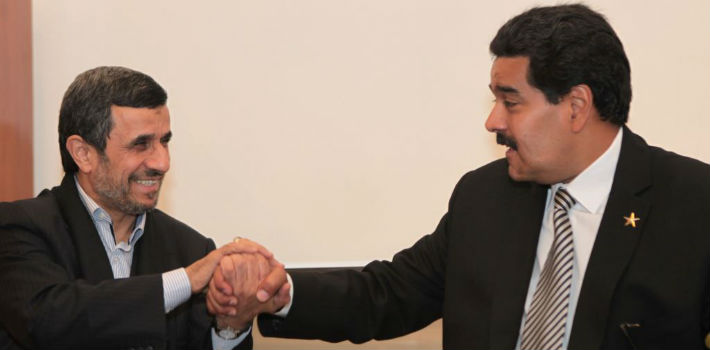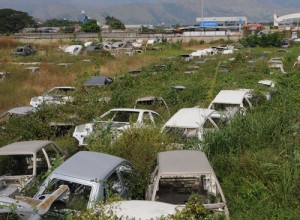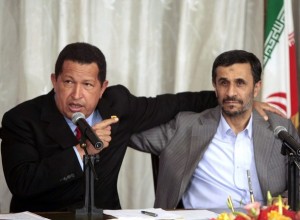
EspañolIn its Management Report for 2014, the Venezuelan Comptroller’s Office has reported “irregularities” in negotiations between the Intermediate Industries Corporation of Venezuela (Corpivensa) and Iranian construction firm Tarasazeh Tabriz, according to news website RunRun.es.
The state firm Corpivensa signed a deal in 2012 securing Iranian technology and blueprints to build lightweight metal structures as part of the Misión Vivienda — a flagship government program designed to provide affordable housing for Venezuelan citizens.
However, the state audit office found that several of the agreed items were not delivered: blueprints, operation manuals, equipment catalogs, and delivery notes. According to a statement issued by the investigating body, the “accumulation of irregularities” prevented the authorities from meeting Misión Vivienda objectives.
Fruitless Relationship
The abortive deal is not the first instance of joint cooperation initiatives — brokered under the aegis of close diplomatic ties — failing to produce benefits for the Venezuelan taxpayer.

In 2006, the government of former President Hugo Chávez opened the Venirauto Industrias C.A. firm, jointly funded by Venezuela and Iran with the objective of assembling vehicles in Venezuela with Iranian parts.
In 2010, the firm’s own data reflected annual losses of 33,447,428 Bs. (approximately US$4 million, under exchange rates at the time).
Production figures were similarly disappointing. Venirauto assembled 2,108 units and concluded the year with 1,214 unsold units from “previous years” gathering rust.
State funds assigned to the firm in 2011 meanwhile reached 887 million Bs. ($113 million) of which managers spent only 37 percent, or 326 million Bs. ($41 million).
Nevertheless, the expenditure continued, with the government granting over a billion bolívares ($111 million) to Venirauto management in 2012, who again spent no more than 39 percent of the the annual budget, or 437 million Bs. ($48 million). Venirauto never explained the eventual destination of the unspent funds.
In 2014, then-Vice Minister for Industry Carlos Faría, met with Venirauto directors and announced a “relaunch and new start of all operations.” The concrete details of the relaunch are still unknown.
A similar situation occurred with the National Factory of Atomic Bicycles (Fanabi). In 2008, Chávez announced the opening of Fanabi, which was to produce a thousand bicycles per month using Iranian technology. In 2012, national daily El Mundo reported that work at the plant had ground to a halt. The firm, which belongs to Corpivensa, currently has no website, nor are there any official outlets offering information on production levels.
Return of the “Phantom Flight”
Another instance of Caracas-Tehran cooperation took place in 2007, with the opening of flights between the two capitals via a stopover in Damascus, Syria, operated by Venezuelan state firm Conviasa and Iran Air. While no individual flight ever sold over half of its available seats, customers had to reserve their tickets a year in advance.
Despite minimal levels of tourism between the Bolivarian Republic and its Islamic counterpart, and concerns over the lack of screening and security procedures for the Conviasa-Iran Air service, Chávez proceeded in 2009 to announce a direct flight between the Venezuelan and Iranian capitals operated by Tehran-based firm Mahan Air.
In 2010, Spanish daily ABC reported the existence of a “phantom plane” which allegedly transported “Venezuelan uranium and other strategic materials required by the Persians’ nuclear industry.” Washington reportedly believed that Tehran was meanwhile using the air route to export “its terrorist activities to Latin America.”
Both flights were suspended in 2010, but current Venezuelan President Nicolás Maduro reactivated the direct service on January 10, 2015, “in order to promote tourism between both nations.” Maduro didn’t disclose the company that is to operate the service.
On March 24, Brazilian daily Veja quoted a former Chávez government official as saying that between 2007 and 2010 Conviasa sold phantom fares to facilitate the transit of drugs, terrorists, and money, and describing the airline’s activities as “aerial terror.”
Veja reported that while the cost to the Venezuelan government of running the flight over the three years amounted to $36.6 million, income via ticket sales only added up to $15 million.
Gang of Three
On March 17, 2015, the United Senate Foreign Relations Committee heard expert testimony on the links between Iran, Venezuela, and Argentina. During the session, IBI Consultants Director Douglas Farah detailed the alleged connections of the Chávez and Maduro governments with narcotrafficking, and discussed the alleged participation of the three governments in a cover-up of the 1994 bombing of the AMIA Jewish center in Buenos Aires.
Farah argued that “the warming relationship between Iran and Argentina was directly brokered by Venezuelan leaders,” which led to the “illegal” exchange of cheap Iranian petroleum for grain, and Argentina’s silence on the alleged involvement of Iranian officials in the AMIA attack.

Those specialists who addressed the committee offered information that multiple Middle Eastern countries have established global criminal networks via Iran, in which Venezuelan officials are allegedly implicated. Iranian military officials were also accused of being behind the training of armed Venezuelan “collectives” loyal to the government.
Former US Ambassador to Venezuela Otto Reich explained to the CNN Spanish news channel why relations between Venezuela and Iran are considered a threat, alleging that Venezuela had helped Iran secure weapons-grade material to manufacture nuclear weapons.
The US State Department had previously expressed its concern in 2005 over Venezuela’s foreign policy, after Chávez announced Venezuelan support for the nascent Iranian uranium enrichment program — which it has consistently claimed is geared towards energy production — opposed by the United States and the European Union.
Venezuela announced its position in an OPEC meeting in January 2006, in which it threatened to increase the price of its petroleum if a resolution were issued against Iran in the UN Security Council.
Orlando Avendaño and Elisa Vásquez contributed to this article.
 Versión Español
Versión Español












